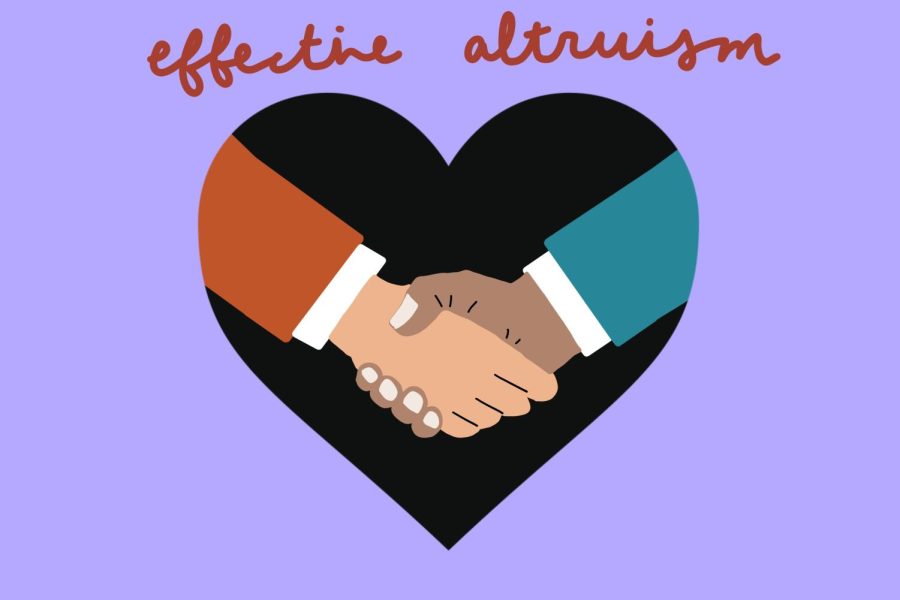Effective Altruism Northwestern explores what it means to improve the world
Effective Altruism Northwestern is a club dedicated to quantifying impact and examining how to best use careers and resources for the most good possible.
April 26, 2023
McCormick junior Julian Baldwin learned about Effective Altruism Northwestern, a philosophical club, during his freshman year. He read more about effective altruism the following summer and found himself drawn to the club’s mission: exploring how the community can do the most good the most efficiently. Now, he’s the club’s co-president.
According to its website, EANU consists of a group of students who are unified by a desire to do the most they can to “improve the world.” The purpose of effective altruism, the website says, is to analyze how to allocate resources and make the best possible efforts to help others — and then take action.
Practicing effective altruism often means making measurable, evidence-based changes to approach world issues, according to club member and Weinberg freshman Samarth Arul.
EANU runs multiple discussion-based fellowships and programs in cohorts throughout the academic year. The sequences include readings and discussions on topics like longtermism, biosecurity and animal welfare.
New EANU members join the Introductory Fellowship for seven weeks and examine central ideas about effective altruism, such as tradeoffs and marginal impact. The In-Depth Fellowship, for those who have completed the introductory course, allows members to dive deeper into the movement’s nuances and the concept of cause prioritization.
“It’s more like offering a framework for people to launch and actually try to really do something with their career,” Baldwin said. “If you take philosophy classes I think it can be kind of frustrating, because it’s very easy to just spiral off endlessly into things that don’t feel as important to define.”
Baldwin, a computer science major, helped lead the club’s AI Safety Fundamentals Program. The quarter-long seminar dives into ethical issues surrounding artificial intelligence. It also explores governance and the interactions between AI systems and the real world. The program’s first cohort convened in Spring Quarter 2022.
“One of the biggest, most neglected problems in the world is trying to solve the technical problems of how we make AI actually be aligned with humanity’s interests,” he said.
Arul joined EANU because he had a prior interest in philosophy and effective altruism.
He said he participated in the AI Safety Program because he’s seen issues surrounding artificial intelligence become more “pressing” in recent years.
“In terms of a lot of metrics, it seems like AI has a potential to become extremely intelligent and hard to control,” Arul said. “One of the goals of not really that group, but more just the field in general is to think about how we can best align AI to be safe for human use.”
Each Friday, the club socializes with dinner, games and discussion.
These casual hangouts attracted Weinberg sophomore Eduardo Andrade, a general board member, to the club.
“It’s definitely very welcoming, which was nice when I first got involved,” he said. “It’s also nice to be around people that care about things and are working on structuring their lives so that they’re able to impact and improve the world in a long-term way.”
The EANU community encourages people to challenge one another to be open to new viewpoints, according to Andrade. He said the club has helped him hone his critical thinking skills.
The club attracts members from a variety of majors, according to Baldwin. He said there are currently about 40 to 50 members in EANU, including computer science, philosophy and journalism majors.
Arul said the club community is “very intellectually driven.”
“It’s just an amazing place to be around people who are really motivated to learn and really, genuinely curious about world issues and how to solve them and how to approach them,” Arul said.
Email: karapeeler2025@u.northwestern.edu
Twitter: @karapeeler
Related Stories:
— ‘At your fingertips’: Students develop platform ClubConnect to centralize club communication
— Northwestern community members discuss use of AI program ChatGPT to write academic papers
— New student group spreads awareness of artificial intelligence ethics, big data injustices



